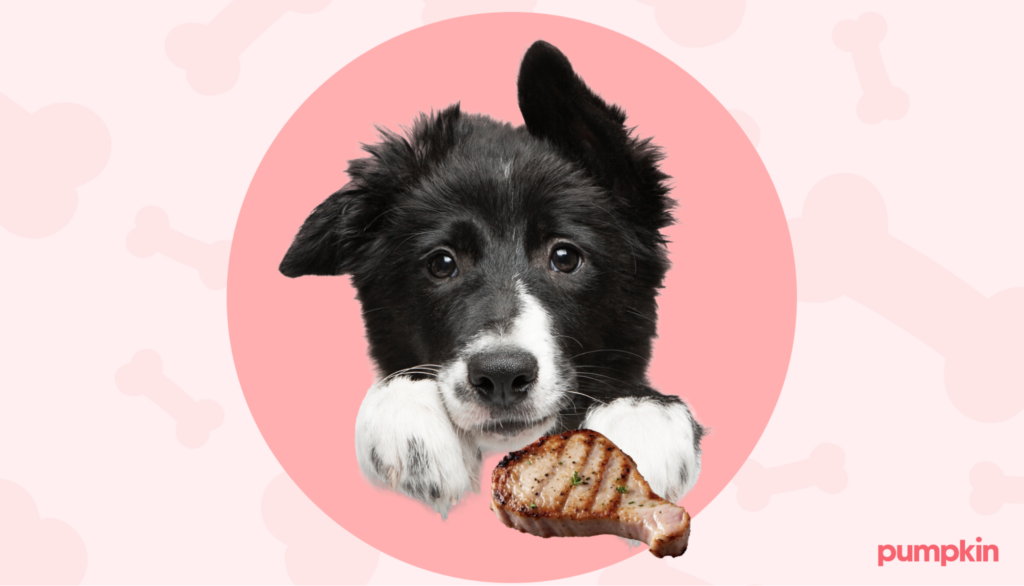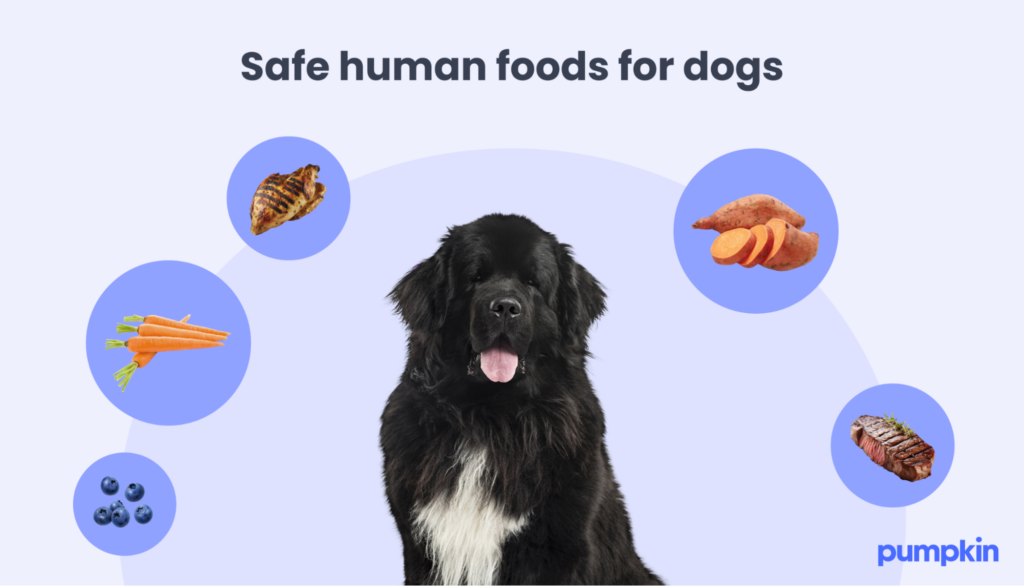Key Points
- Dogs can eat pork, but it should be cooked and unseasoned.
- Pork provides a rich source of protein and can be a part of a balanced diet for dogs.
- Moderation is key when feeding pork to dogs to avoid health issues like pancreatitis.
Pork chops, belly, and tenderloin are all delicious meal options. If pork is on the menu, you’ll want to share the love with every member of your family — including your pup.
The question is, can you serve this meat to your four-legged friend?
Pork can be safe for dogs, so you don’t need to say “no” when they start to beg for your dinner. But there are a few important exceptions to the rule, and pork needs to be prepared correctly.
Is pork safe for dogs to eat?
Yes, most dogs can eat pork in moderation. It’s a protein-rich meat that can contribute to a balanced diet. However, pork needs to be cooked properly because raw or undercooked pork can carry parasites and harmful bacteria. One of the most common food-borne diseases found in raw pork is Trichinosis, which comes from the larvae of roundworms.
You should also avoid feeding your dog seasoned pork. This often contains spices and ingredients, like onions and garlic, that are toxic for dogs. Ham and bacon are also no-no’s, due to their high fat and salt content. While ham and bacon aren’t toxic to dogs, on balance, we think they do more harm than good. If you can’t resist sharing a bite of bacon with a very good boy or girl, limit this treat to a small nibble on special occasions.
Can puppies eat pork?
Once your puppy is on a solid diet, pork can be given as a safe and tasty treat. Raw meat can be dangerous, so make sure the pork is cooked thoroughly and free from any seasonings.
Puppies are still learning and don’t always know their limits. Always cut the pork into small pieces and avoid any bones to reduce the risk of choking.

When introducing new human foods to your pet, start with a small bite. Keep an eye on your pup to make sure they don’t have a bad reaction.
What are the benefits of pork for dogs?
Pork is packed with protein, which is essential for muscle development and energy in dogs. It also contains other beneficial nutrients, including:
- Vitamin B6: for heart health, a shiny coat, and red blood cell production
- Vitamin B12: for brain function, nervous system support, and digestion
- Niacin: for cognitive function and the prevention of neurodegenerative disease
- Phosphorus: for healthy teeth, metabolism support, and strong bones
- Zinc: for a healthy immune system, wound healing, and thyroid function
- Iron: for energy production and a healthy circulatory system
However, even though pork can be part of a healthy diet, it shouldn’t be the main food for your dog. Depending on the cut, this juicy treat can be high in fat and salt.
What are the risks of feeding pork to dogs?
While pork itself is not toxic to dogs, raw or undercooked pork can carry harmful bacteria and parasites.
For example, raw pork can contain Escherichia coli (E-coli), which can cause diarrhea and other stomach troubles.
Then, there is trichinella spiralis larvae, a type of roundworm that can also be present in raw meat. This can lead to a disease called Trichinosis. Symptoms can include vomiting, diarrhea, swelling, and muscle stiffness.
What about salmonella poisoning? This is a real risk for humans who eat undercooked pork, but it’s rare in dogs. If your pup is young or has an underlying health condition, they’re more likely to get symptoms. Signs of food poisoning from raw meat include severe vomiting and dehydration.
Cooking pork at the right temperature can help eliminate parasites and bacteria, for both pets and their owners.
Lastly, pork bones can be a choking hazard. Like chicken, these bones can be brittle and break off, causing intestinal damage and blockages.
How to feed your dog pork
Want to introduce pork to your dog’s diet? Start with small amounts and look out for any adverse reactions.
Here are some ways to safely feed pork to your pooch:
- Boil plain pork loin chops until they are cooked through. Cut into small pieces and remove any bones before serving.
- Chop cooked pork and serve with vegetables and rice as their main meal
- Pan-fry unseasoned, lean tenderloin and serve in bite-sized pieces
If your dog shows any signs of an upset stomach or allergic reaction, stop feeding them pork products. Consult with your veterinarian for personalized advice.
How much pork can your dog eat?
The amount of pork your dog can consume depends on their size, age, and overall health.
While meat is part of a healthy diet, your dog needs a mix of water, vitamins, minerals, fats, protein, and carbs. As a general guideline, treats (including meat like pork) should make up no more than 10% of your dog’s daily caloric intake.
What to do if your dog eats too much pork
If your dog eats too much pork, they may experience gastrointestinal upset, with symptoms such as vomiting, diarrhea, and loss of appetite.
In severe cases, eating the fatty cuts of the pig can lead to pancreatitis over time. This is a serious condition that requires immediate veterinary attention.
Even with the right precautions, some dogs have food allergies. If your dog is allergic to pork, symptoms may include:
- Itchy skin
- Ear infections
- Sneezing
- Shortness of breath
- Hair loss
If you notice any unusual symptoms, contact your veterinarian right away.
What other human foods can dogs eat?
While pork can be a part of a balanced diet for dogs, there are many other human foods that they can safely consume.

Here are a few pork alternatives that can be served in moderation:
- Chicken: Chicken is a lean source of protein. Serve it cooked, plain, and unseasoned.
- Beef: Beef is rich in essential amino acids. Pan-fry, grill, or bake plain beef before sharing with your pooch.
- Carrots: Carrots are a good source of vitamin A, fiber, and potassium. Plain raw and cooked carrots are safe to share.
- Blueberries: Okay in moderation, blueberries are packed with antioxidants, vitamin C, vitamin K, potassium, and magnesium.
- Sweet potatoes: Peeled and cooked sweet potatoes are safe for dogs and loaded with dietary fiber.
The verdict: Can dogs have pork?
The good news: Pork can be a part of a balanced canine diet when served properly.
But it’s important to remember that not all pork is safe for dogs. For example, raw meat and pork bones can pose significant health risks. From parasites to choking to allergies — this food does come with risks.
As always, when introducing new foods to your dog’s diet, monitor them to make sure there are no issues. And if you have questions, it’s best to consult with your veterinarian. Worried about the cost of treatment? Learn more about how Pumpkin pet insurance plans help cover the cost of eligible vet bills in the future.
FAQs
- https://my.clevelandclinic.org/health/diseases/7142-trichinosis
- https://www.healthline.com/nutrition/foods/pork#nutrition
- https://www.akc.org/expert-advice/nutrition/vitamins-dogs-need-healthy-lifestyle/
- https://ask.usda.gov/s/article/What-foodborne-organisms-are-associated-with-pork
- https://www.msdvetmanual.com/dog-owners/disorders-affecting-multiple-body-systems-of-dogs/trichinellosis-trichinosis-in-dogs
- https://vcahospitals.com/know-your-pet/dogs-and-raw-food-diets
- https://www.akc.org/expert-advice/nutrition/how-many-treats-can-dog-have/




